#the loss of life is immaterial
Text
Why is Leftblr plagued by political Karens ?
And no, I can't think of any other way to refer to so, so, so many of you who gleefully cheer for Hamas, deny or justify their crimes, apply a double standard against Israel (always in favour of the terrorist organisation, always), and so on and so forth.
Make no mistake, what Israel is doing in Gaza is horrible (though I would argue there's little alternative considering Hamas' goals and behaviour so far), and it's getting especially awful and violent in the West Bank, with too little oversight and far too much political complicity from the current Israeli government.
But what I'm talking about, in your behaviour, is in direct relation to the 7/10 attack, not what's happening in the West Bank.
You don't look at their ideology. Do you know what the ideology of Hamas is ? It's the same as Al Qaeda, the same as ISIS, the same as Boko Haram. It's violent, totalitarian islamism. It is intolerant and hateful, it wants to kill all who do not fit its mold. They openly - OPENLY - said they wanted to take over the world, and that once they were done with the Jews (the Jews, not the Israeli, the JEWS) it would be the Christians' turns. Does that sound like someone you want to cheer on ? Does that sound tolerant and acceptant ?
For me, as a French, all Hamas is, is another form of the monsters that killed hundreds in the Bataclan. That sent a truck through the crowd in Nice on the Promenade des Anglais. That murdered and took hostages in the Hyper Kasher.
It's the same cruelty and hate, the same interpretation of Islam that pushed Mohammed Merah to murder children in school in 2012. Because those kids were Jewish.
And all I can think, when I watch how you react ... how you cheer on Hamas ... is that it isn't the acts that bother you. It's whether it has the right stickers, the right buzzwords associated to it.
You're like a Karen, ranting and throwing a tantrum, because the mangos don't have the little organic sticker.
It's not an organix, marx-fed terror attack, so you don't like it. But the one in Israel, oh this one, it has the sticker, you're sure of it. You put it there yourself, because it is much, much more socially acceptable, in your little social circle of murderous, bloodthirsty political Karens to stamp your little Revolution-certified sticker on that particular terror attack.
But it's the same ideology, Karen. The mangos are identical. The murders are the same. The only real difference is the numbers.
And you can go "But IDF in Gaza D:" all you want. All I hear, is that you're willing to support ISIS, Al Qaeda and Boko Haram, so long as they put the right stickers on their murders.
You don't need to cheer for the monsters. You don't need to cheer for ISIS under a different flag.
You can criticize Israel without being antisemitic, as you keep saying. Maybe you should start doing that.
#israel/palestine#israel#palestine#antisemitism#karen#political karen#they want their organic revolution-certified terror attacks#It's about self image#the loss of life is immaterial#you cheer on Hamas you cheer on ISIS#you cheer on Hamas you cheer on Al Qaeda#You cheer on Hamas you cheer on Boko Haram#hamas#hamas attack#leftblr#leftist
56 notes
·
View notes
Text
Can't believe this blog has existed THIS long, and I've somehow never shared this Sherlock Holmes fanfic by PG Wodehouse. As far as I know it predates Conan Doyle publishing any stories which mention Holmes retiring to keep bees, which presents the delightful possibility that ACD discussed his future plans for Holmes with his young friend Plum, whose first reaction was to go off and write (and publish) a cute parody of it.
The Adventure of the Missing Bee
Sherlock Holmes is to retire from public life after Christmas, and take to bee-farming in the country.
"It is a little hard, my dear Watson," said Holmes, stretching his long form on the sofa, and injecting another half-pint of morphia with the little jewelled syringe which the Prince of Piedmont had insisted on presenting to him as a reward for discovering who had stolen his nice new rattle; "it is just a little hard that an exhausted, overworked private detective, coming down to the country in search of peace and quiet, should be confronted in the first week by a problem so weird, so sinister, that for the moment it seems incapable of solution."
"You refer—?" I said.
"To the singular adventure of the missing bee, as anybody but an ex-army surgeon equipped with a brain of dough would have known without my telling him."
I readily forgave him his irritability, for the loss of his bee had had a terrible effect on his nerves. It was a black business. Immediately after arriving at our cottage, Holmes had purchased from the Army and Navy Stores a fine bee. It was docile, busy, and intelligent, and soon made itself quite a pet with us. Our consternation may, therefore, be imagined when, on going to take it out for its morning run, we found the hive empty. The bee had disappeared, collar and all. A glance at its bed showed that it had not been slept in that night. On the floor of the hive was a portion of the insect's steel chain, snapped. Everything pointed to sinister violence.
Holmes' first move had been to send me into the house while he examined the ground near the hive for footsteps. His search produced no result. Except for the small, neat tracks of the bee, the ground bore no marks. The mystery seemed one of those which are destined to remain unsolved through eternity.
But Holmes was ever a man of action.
"Watson," he said to me, about a week after the incident, "the plot thickens. What does the fact that a Frenchman has taken rooms at Farmer Scroggins' suggest to you?"
"That Farmer Scroggins is anxious to learn French," I hazarded.
"Idiot!" said Holmes, scornfully. "You've got a mind like a railway bun. No. If you wish to know the true significance of that Frenchman's visit, I will tell you. But, in the first place, can you name any eminent Frenchman who is interested in bees?"
I could answer that.
"Maeterlinck," I replied. "Only he is a Belgian."
"It is immaterial. You are quite right. M. Maeterlinck was the man I had in my mind. With him bees are a craze. Watson, that Frenchman is M. Maeterlinck's agent. He and Farmer Scroggins have conspired, and stolen that bee."
"Holmes!" I said, horrified. "But M. Maeterlinck is a man of the most rigid honesty."
"Nobody, my dear Watson, is entirely honest. He may seem so, because he never meets with just that temptation which would break through his honesty. I once knew a bishop who could not keep himself from stealing pins. Every man has his price. M. Maeterlinck's is bees. Pass the morphia."
"But Farmer Scroggins!" I protested. "A bluff, hearty English yeoman of the best type."
"May not his heartiness be all bluff?" said Holmes, keenly. "You may take it from me that there is literally nothing that that man would stick at. Murder? I have seen him kill a wasp with a spade, and he looked as if he enjoyed it. Arson? He has a fire in his kitchen every day. You have only to look at the knuckle of the third finger of his left hand to see him as he is. If he is an honest man, why does he wear a made-up tie on Sundays? If he is an upright man, why does he stoop when he digs potatoes? No, Watson, nothing that you can say can convince me that Farmer Scroggins has not a black heart. The visit of this Frenchman—who, as you can see in an instant if you look at his left shoulder-blade, has not only deserted his wife and a large family, but is at this very moment carrying on a clandestine correspondence with an American widow, who lives in Kalamazoo, Mich. — convinces me that I have arrived at the true solution of the mystery. I have written a short note to Farmer Scroggins, requesting him to send back the bee and explaining that all is discovered. And that," he broke off, "is, if I mistake not, his knock. Come in."
The door opened. There was a scuffling in the passage, and in bounded our missing bee, frisking with delight. Our housekeeper followed, bearing a letter. Holmes opened it.
"Listen to this, Watson," said Holmes, in a voice of triumph.
"'Mr. Giles Scroggins sends his compliments to Mr. Sherlock Holmes, an' it's quite true, I did steal that there bee, though how Mr. Holmes found out, Mr. G. Scroggins bean't able to understand. I am flying the country as requested. Please find enclosed 1 (one) bee, and kindly acknowledge receipt to
'Your obedient servant,
'G. Scroggins.
'Enclosure.'?"
"Holmes," I whispered, awe-struck, "you are one of the most remarkable men I ever met."
He smiled, lit his hookah, seized his violin, and to the slow music of that instrument turned once more to the examination of his test tubes.
Three days later we saw the following announcement in the papers: "M. Maeterlinck, the distinguished Belgian essayist, wishes it to be known that he has given up collecting bees, and has taken instead to picture postcards."
530 notes
·
View notes
Text
EXTERNAL INFLUENCES IN DUNGEON MESHI: INDIAN PHILOSOPHY
(SPOILERS FOR DUNGEON MESHI BELOW)
We know that Ryoko Kui spent considerable time at the beginning of working on Dungeon Meshi doing research and planning the series. Kui constantly references real world culture, history and mythology, but she also occasionally references real-world philosophy.
The story of Dungeon Meshi is full of philosophical questions about the joy and privilege of being alive, the inevitability of death and loss, the importance of taking care of yourself and your loved ones, and the purpose and true nature of desire. Kui explores these issues through the plot, the characters, and even the fundamental building blocks that make up her fictional fantasy world. Though it’s impossible to say without Kui making a statement on the issue, I believe Dungeon Meshi reflects many elements of ancient Indian philosophy and religion.
It’s possible that Kui just finds these ideas interesting to write about, but doesn’t have any personal affiliation with either religion, however I would not be at all surprised if I learned that Kui is a Buddhist, or has personal experience with Buddhism, since it’s one of the major religions in Japan.
I could write many essays trying to explain these extremely complex concepts, and I know that my understanding of them is imperfect, but I’ll do my best to explain them in as simple a way as possible to illustrate how these ideas may have influenced Kui’s work.
HINDUISM
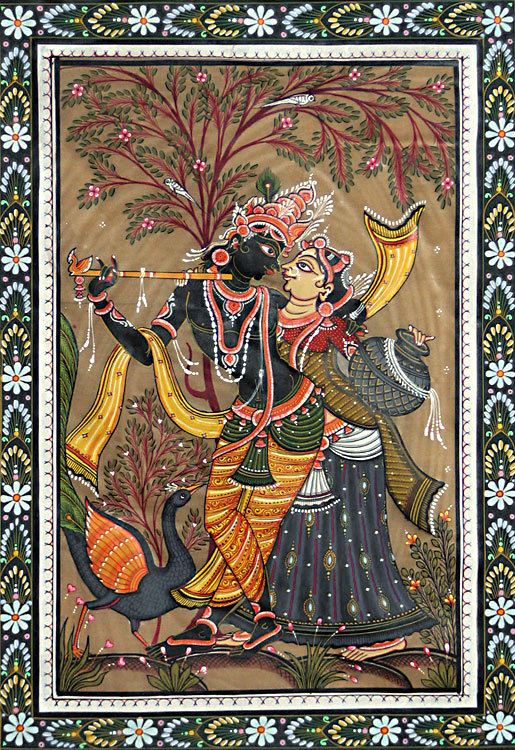
Hinduism is the third-largest religion in the world and originates in India. The term Hinduism is a huge umbrella that encompasses many diverse systems of thought, but they have some shared theological elements, and share many ancient texts and myths.
According to Classical Hindu belief, there are four core goals in human life, and they are the pursuit of dharma, artha, kama, and moksha.
Dharma is the natural order of the universe, and also one’s obligation to carry out their part in it. It is the pursuit and execution of one’s inherent nature and true calling, playing one’s role in the cosmic order.
Artha is the resources needed for an individual’s material well-being. A central premise of Hindu philosophy is that every person should live a joyous, pleasurable and fulfilling life, where every person's needs are acknowledged and fulfilled. A person's needs can only be fulfilled when sufficient means are available.
Kama is sensory, emotional, and aesthetic pleasure. Often misinterpreted to only mean “sexual desire”, kama is any kind of enjoyment derived from one or more of the five senses, including things like having sex, eating, listening to music, or admiring a painting. The pursuit of kama is considered an essential part of healthy human life, as long as it is in balance with the pursuit of the three other goals.
Moksha is peace, release, nirvana, and ultimate enlightenment. Moksha is freedom from ignorance through self-knowledge and true understanding of the universe, and the end of the inevitable suffering caused by the struggle of being alive. When one has reached true enlightenment, has nothing more to learn or understand about the universe, and has let go of all earthly desires, they have attained moksha, and they will not be reborn again. In Hinduism’s ancient texts, moksha is seen as achievable through the same techniques used to practice dharma, for example self-reflection and self-control. Moksha is sometimes described as self-discipline that is so perfect that it becomes unconscious behavior.
The core conflict of Hinduism is the eternal struggle between the material and immaterial world. It is often said that all of the material world is “an illusion,” and what this means is that all good and bad things will inevitably end, because the material world is finite. On the one hand, this is sad, because everything good in life will one day cease to exist, but on the other hand, this is reassuring, because all of the bad things will eventually end as well, and if one can accept this, they will be at peace.
The central debate of Hinduism is, which is more important: Satisfying your needs as a living thing, having a good life as a productive member of society, serving yourself, your family, and the world by participating in it the way nature intended? Or is it rejecting desire and attachment, discovering the true nature of existence, realizing the impermanence of material things, and that one can only escape the suffering that comes from the struggle of life by accepting that death and loss are inevitable?
There is no set answer to this question, and most believers of Hinduism tend to strike a balance between the two extremes simply because that’s what happens when a person leads a normal, average life, however there are also those who believe that pursuing extremes will lead to ultimate enlightenment and final release as well.
BUDDHISM
Buddhism is an Indian religion and philosophical tradition that originated in the 5th century BCE, based on teachings attributed to religious teacher the Buddha. It is the world's fourth-largest religion and though it began in India, it has spread throughout all of Asia and has played a major role in Asian culture and spirituality, eventually spreading to the West beginning in the 20th century.
Buddhism is partially derived from the same worldview and philosophical belief system as Hinduism, and the main difference is that the Buddha taught that there is a “middle way” that all people should strive to attain, and that the excesses of asceticism (total self-denial) or hedonism (total self-indulgence) practiced by some Hindus could not lead a person to moksha/enlightenment/release from suffering.
Buddhism teaches that the primary source of suffering in life is caused by misperception or ignorance of two truths; nothing is permanent, and there is no individual self.
Buddhists believe that dukkha (suffering) is an innate characteristic of life, and it is manifested in trying to “have” or “keep” things, due to fear of loss and suffering. Dukkha is caused by desire. Dukkha can be ended by ceasing to feel desire through achieving enlightenment and understanding that everything is a temporary illusion.
There are many, many other differences between Hinduism and Buddhism, but these elements are the ones that I think are most relevant to Kui’s work.
Extreme hedonism involves seeking sensual pleasure without any limits. This could just be indulging in what people would consider “normal” pleasures, like food, sex, drugs and the arts, but it can also involve doing things which are considered socially repugnant, either literally or by taking part in symbolic rituals that represent these acts. Some examples are holding religious meetings in forbidden places, consuming forbidden substances (including human flesh), using human bones as tools, or engaging in sex with partners who are considered socially unacceptable (unclean, wrong gender, too young, too old, related to the practitioner). Again, these acts may be done literally or symbolically.
Extreme ascetic practices involve anything that torments the physical body, and some examples are meditation without breathing, the total suppression of bodily movement, refusing to lay down, tearing out the hair, going naked, wearing rough and painful clothing, laying on a mat of thorns, or starving oneself.
HOW THIS CONNECTS TO DUNGEON MESHI
Kui’s most emphasized message in Dungeon Meshi is that being alive is a fleeting, temporary experience that once lost, cannot truly be regained, and is therefore precious in its rarity. Kui also tells us that to be alive means to desire things, that one cannot exist without the other, that desire is essential for life. This reflects the four core goals of human life in Hinduism and Buddhism, but also could be a criticism of some aspects of these philosophies.
I think Kui’s story shows the logical functionality of the four core goals: only characters who properly take care of themselves, and who accept the risk of suffering are able to thrive and experience joy. I think Kui agrees with the Buddhist stance that neither extreme hedonism nor extreme self-denial can lead to enlightenment and ultimate bliss… But I also think that Kui may be saying that ultimate bliss is an illusion, and that the greatest bliss can only be found while a person is still alive, experiencing both loss and desire as a living being.
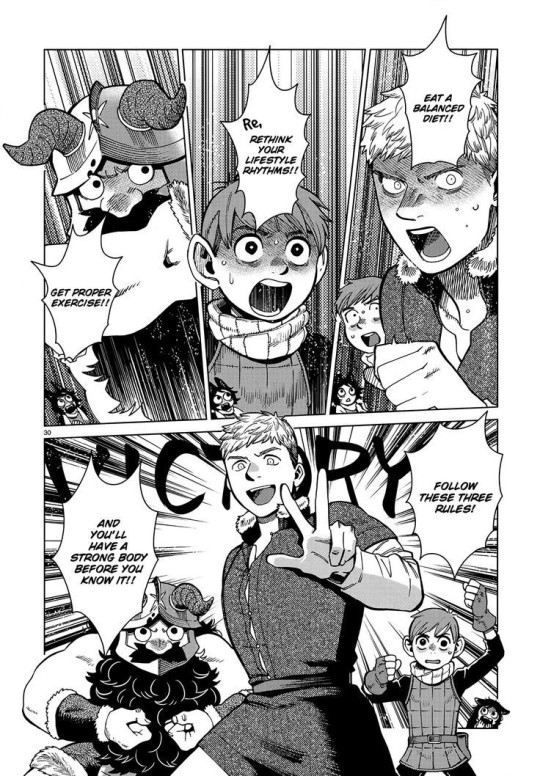
Kui tells us living things should strive to remain alive, no matter how difficult living may be sometimes, because taking part in life is inherently valuable. All joy and happiness comes from being alive and sharing that precious, limited life with the people around you, and knowing that happiness is finite and must be savored.
Dungeon Meshi tells us souls exist, but never tells us where they go or what happens after death. I think this is very intentional, because Kui doesn’t want readers to think that the characters can just give up and be happy in their next life, or in an afterlife.
There is resurrection in Dungeon Meshi, but thematically there are really no true “second chances.” Although in-universe society views revival as an unambiguous good and moral imperative, Kui repeatedly reminds us of its unnatural and dangerous nature. Although reviving Falin is a central goal of the story, it is only when Laios and Marcille are able to let go of her that the revival finally works… And after the manga’s ending, Kui tells us Falin leaves Laios and Marcille behind to travel the world alone, which essentially makes her dead to them anyway, since she is absent from their lives.
At the same time, Kui tells us that trying to prevent death, or avoid all suffering and loss is a foolish quest that will never end in happiness, because loss and suffering are inevitable and must someday be endured as part of the cycle of life. Happiness cannot exist without suffering, just like the joy of eating requires the existence of hunger, and even starvation.
Kui equates eating with desire itself, using it as a metaphor to describe anything a living creature might want, Kui also views the literal act of eating as the deepest, most fundamental desire of a living thing, the desire that all other desires are built on top of. If a living thing doesn’t eat, it will not have the energy necessary to engage with any other part of life. Toshiro, Mithrun, and Kabru are all examples of this in the story: They don’t take care of themselves and they actively avoid eating, and as a result they suffer from weakness, and struggle to realize their other desires.
Kui suggests that the key difference between being alive or dead is whether or not someone experiences desire. If you are alive, even if you feel empty and cannot identify your desires like Mithrun, you still have desires because you would be dead without them. The living body desires to breathe, to eat, to sleep, even if a person has become numb, or rejected those desires either to punish themselves, or out of a lack of self-love.
Sometimes, we have to do things which are painful and unpleasant, in order to enjoy the good things that make us happy. I believe Kui is telling us that giving up, falling into despair, and refusing to participate in life is not a viable solution either.
The demon only learns to experience desire by entering into and existing in the material, finite world. This experience intoxicates the demon, and it becomes addicted to feeling both the suffering of desire, and the satisfaction of having it fulfilled. This unnatural situation is what endangers the Dungeon Meshi world, and it’s only by purging the demon of this ability to desire that the world can be saved. The demon is like a corrupted Buddha that must give up its desires in order to return to the peaceful existence it had before it was corrupted.
The demon curses Laios to never achieve his greatest desires at the end of the manga, which manifests in several ways, such as losing his monstrous form, Falin choosing to leave after she’s revived, and being unable to get close to monsters because they are afraid of him. In some ways you could compare Laios to a Bodhisattva, a person who tries to aid others in finding nirvana/moksha, even if it prolongs their own suffering and prevents them from finding personal release. Laios gives the demon peace, but Laios himself will never be able to satisfy his desires, and must eventually come to accept his loss and move on with his life.
(This is an excerpt from Chapter 3 of my Real World Cultural and Linguistic influences in Dungeon Meshi essay.)
#dungeon meshi#delicious in dungeon#the winged lion#dungeon meshi spoilers#laios touden#mithrun of the house of kerensil#analysis#The Essay#After all the conversation about Mithrun I felt it was really important to drop this excerpt today
135 notes
·
View notes
Text
Dungeon Meshi as Monster Culture
-jeffrey jerome cohen as a framework for dungeon meshi
i. The Monsters Body is a cultural body
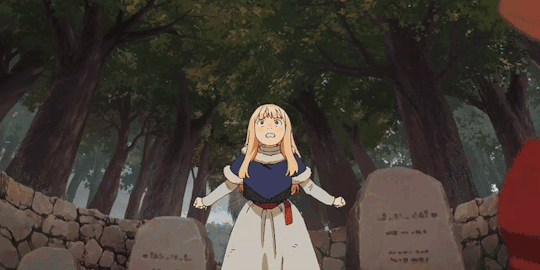
Vampires, burial, death: inter the corpse where the road forks...it will haunt that place that leads to many other places, that point of indecision...The monster is born only at this metaphoric crossroads, as an embodiment of a certain cultural moment—of a time, a feeling, and a place
ii. The Monster Always Escapes
We see the damage that the monster wreaks, the material remains...but the monster itself turns immaterial and vanishes, to reappear someplace else.
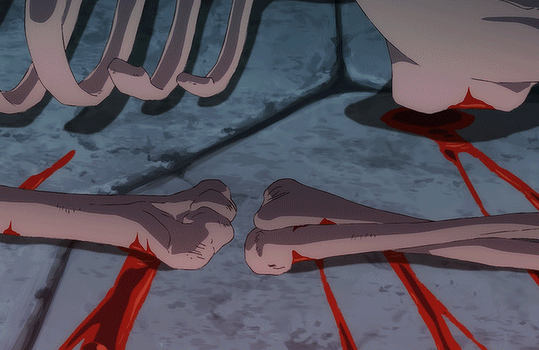
No monster tastes of death but once... Each time the grave opens and the unquiet slumberer strides forth("come from the dead, / Come back to tell you all"), the message proclaimed is transformed by the air that gives its speaker new life...monstrous interpretation is as much process as epiphany, a work that must content itself with fragments (footprints, bones, talismans, teeth, shadows, obscured glimpses—signifiers of monstrous passing that stand in for the monstrous body itself).
iii. The Monster Is the Harbinger of Category Crisis
The monster always escapes because it refuses easy categorization...they are disturbing hybrids whose externally incoherent bodies resist attempts to include them in any systematic structuration. And so the monster is dangerous, a form suspended between forms that threatens to smash distinctions.

The too-precise laws of nature as set forth by science are gleefully violated in the freakish compilation of the monster's body.
Full of rebuke to traditional methods of organizing knowledge and human experience, the geography of the monster is an imperiling expanse, and therefore always a contested cultural space

iv. The Monster dwells at the gate of difference
The monster is difference made flesh, come to dwell among us... the monster is an incorporation of the Outside, the Beyond—of all those loci that are rhetorically placed as distant and distinct but originate Within.

Representing an anterior culture as monstrous justifies its displacement or extermination by rendering the act heroic..A political figure suddenly out of favor is transformed like an unwilling participant in a science experiment by the appointed historians of the replacement regime: "monstrous history" is rife with sudden, Ovidian metamorphose

History itself becomes a monster: defeaturing, self-deconstructive, always in danger of exposing the sutures that bind its disparate elements into a single, unnatural body.
V: The Monster polices the borders of the possible
From its position at the limits of knowing, the monster stands as a warning against exploration of its uncertain demesnes...curiosity is more often punished than rewarded, that one is better off safely contained within one's own domestic sphere than abroad, away from the watchful eyes of the state

To step outside this official geography is to risk attack by some monstrous border patrol or (worse) to become monstrous oneself.
The horribly fascinating loss of Lycaon's humanity merely reifies his previous moral state; the king's body is rendered all transparence, instantly and insistently readable. The power of the narrative prohibition peaks in the lingering description of the monstrously composite Lycaon, at that median where he is both man and beast, dual natures in a helpless tumult of assertion. The fable concludes when Lycaon can no longer speak, only signify.
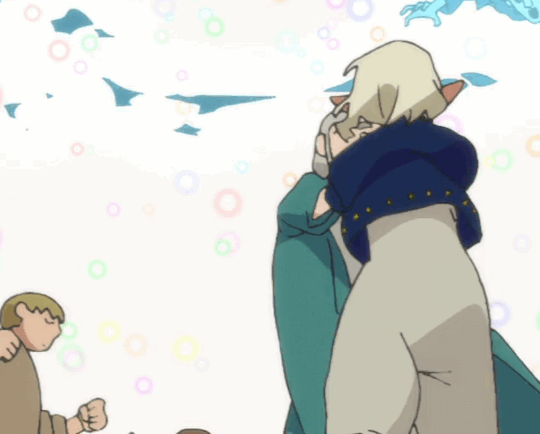
Whereas monsters born of political expedience and self-justifying nationalism function as living invitations to action, usually military (invasions, usurpations, colonizations), the monster of prohibition polices the borders of the possible, interdicting through its grotesque body some behaviors and actions, envaluing others.
victims are devoured, engulfed, made to vanish from the public gaze: cannibalism as incorporation into the wrong cultural body.

vi: Fear of the monster is really a kind of desire
The monster is continually linked to forbidden practices, in order to normalize and to enforce. The monster also attracts. The same creatures who terrify and interdict can evoke potent escapist fantasies; the linking of monstrosity with the forbidden makes the monster all the more appealing as a temporary egress from constraint
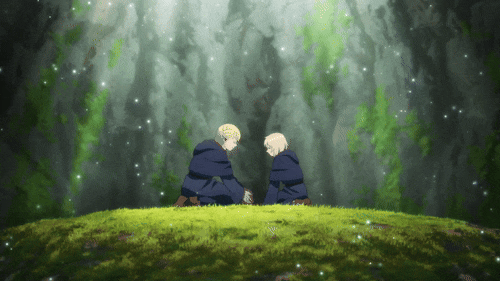
Escapist delight gives way to horror only when the monster threatens to overstep these boundaries, to destroy or deconstruct the thin walls of category and culture. When contained by geographic, generic, or epistemic marginalization, the monster can function as an alter ego, as an alluring projection of (an Other) self. The monster awakens one to the pleasures of the body, to the simple and fleeting joys of being frightened, or frightening—to the experience of mortality and corporality
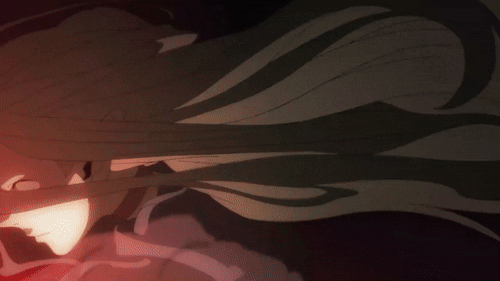
The habitations of the monsters ...are more than dark regions of uncertain danger: they are also realms of happy fantasy, horizons of liberation.
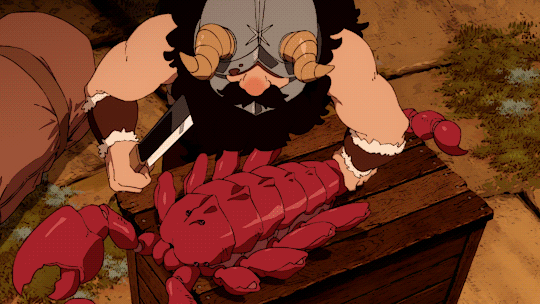
the scapegoated monster is perhaps ritually destroyed in the course of some official narrative, purging the community by eliminating its sins. The monster's eradication functions as an exorcism and, when retold and promulgated, as a catechism
vii: The monster stands at the threshold of becoming
Monsters are our children. They can be pushed to the farthest margins of geography and discourse, hidden away at the edges of the world and in the forbidden recesses of our mind, but they always return.

And when they come back, they bring not just a fuller knowledge of our place in history and the history of knowing our place, but they bear self-knowledge, human knowledge—and a discourse all the more sacred as it arises from the Outside. These monsters ask us how we perceive the world, and how we have misrepresented what we have attempted to place.
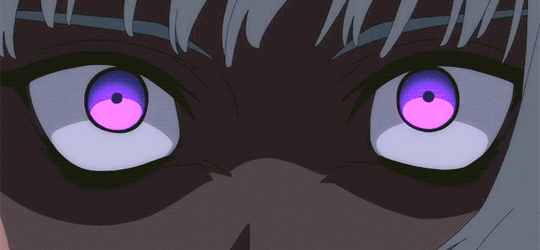
They ask us to reevaluate our cultural assumptions about race, gender, sexuality, our perception of difference, our tolerance toward its expression.
They ask us why we have created them
#dungeon meshi#Technically there's not spoilers for the manga but I think if you read the manga you'll get more out of this#laois touden#Marcille donato#falin touden#the canaries dungeon meshi#the canaries#senshi of izganda#thistle#thistle dungeon meshi#dunmeshi#delicious#delicious in dungeon
101 notes
·
View notes
Text
19/12/2023 Seattle Kraken vs Dallas Stars
The Summer I Fell For Hockey - The Kraken Wagon: How to Stay Silly in the Face of Loss
I’m the asshole on the tram who’s watching hockey on their phone and not paying attention. This is how my afternoon commute home starts. I almost run into at least two people, I definitely trip a guy trying to get off the tram because I’m not looking, and I’m caught scrambling for the door after nearly missing my stop. My walk home is slowed by my unwillingness to take my eyes off the live feed. I’m sweating through an ill-advised sweater vest thrown on at 6 in the morning on my way out the door and my feet sting from the 5 hour shift I just finished — but I don’t care. The Kraken are down 0-2 and it feels like if I stop watching, if I even think about hurrying home through the swampy, muggy afternoon, the game will run away from us.
“The Kraken are a wagon” is a sentiment I’ve come across repeatedly in my idle googling about my team. They’re a new team, my friend tells me over discord — she fell out of love with ice hockey years ago, some time back when the Kraken were first drafting their inaugural season lineup — and as soon as I hear it I am enamoured with them. A baby team! One that’s still building an identity, trying to figure out its core; and I’m already so charmed by their jerseys — toothpaste red, white, and blue, a squiggly tentacle ‘S’ for Seattle and a glaring sea monster’s eye — but a baby team? That’s the kind of story I can gorge myself on.
So they have me. I’m in and I’m reading primers and checking player stats, and I only find out about the “Kraken wagon” later. My squids have been in free fall all season, I learn this not long after I catch a game (their 0-3 defeat to the Minnesota Wild). This is what I get for choosing teams based on jersey colours, it’s not too late to swap loyalties — my regulars, who have by now heard all about my latent ice hockey obsession, tell me this as I pour their coffees. They don’t get it yet. If I truly didn’t like the Kraken, I’d have given up on them by now. The jersey colours, at this point, are immaterial. The jerseys are a cute bonus.
Here’s the rub: no one ever expected them to make the Stanley Cup playoffs in their second ever season of existence, but they did — or, some past incarnation of them did. The shadow that this playoffs run casts, even now, is where the “wagon” accusations stem from. But I didn’t join them when times were good. I joined them after an 8 game-long skid into the boards.
It’s hard to love something when all you ever see are the worst parts of it, some might assume. Looking through the Kraken tag tells an entirely different story. Loving the Seattle Kraken has come so easily to me largely due to the tiny group of die-hard followers I’ve come into contact with. I have a tab perpetually open on my second monitor at home when I’m watching games, set to the Kraken’s liveblog tag, and each time I’ve tuned in has been the ride of my life. It’s clear from the speed at which we like and reblog each other’s posts that we’re all regularly checking the tag when something happens. It’s like the world’s most intimate Twitch chat section, the world’s least intimate discord call. We’re mutuals and besties, strangers and fellow fans — I imagine if we were in the stands together, we’d look at each other when our Kraken score and cheer together, maybe we’d scream and laugh in half-disbelief.
The Dallas Stars are at the top of the Western Conference’s central division table, and they play like it. In the first few minutes of the match, Duchene and Seguin blast through and slip one past Daccord, no easy feat given he’s been on fire himself recently. Time after time, the Kraken’s power play is wrecked. The Kraken are being given the runaround, having to doggedly chase down intercepted pucks where the Stars’ passes always seem to connect. Recovery from 0-2 might seem impossible from where they are at the end of the first period, but the Kraken bring to the second period the same energy they had for their relentless puck hunting. Matty B and Tuna — Beniers and Tatar — put us on the scoreboard and keep us in it, even as we lose Canner and Belly to injuries. Recovery from such an early and demoralising goal deficit isn’t impossible, just increasingly unlikely when you’ve got no superstars and are trying to throw off the wagon allegations.
That’s another thing: expectations are low. And not in a way that’s meant to disrespect the Kraken players — it’s closer to how animals might ball up and protect their vulnerable, soft bellies from harm. Losing, to be perfectly candid, fucking sucks. Reminding ourselves that any gains — no matter how trivial — still count as a win is one way to stave off the inevitable heartbreak. Another way we do it is, to paraphrase several Kraken bloggers, “staying silly”.
If I were to distill the essence of silliness, I’d start with hockey itself. This game is a goofy one, in spite of my past assertions about warrior’s codes and narratives and unspoken honour. On-ice collisions can in fact be the height of slapstick comedy; and today the tension of a potential line brawl was broken with, of all things, the arena DJ playing Mortal Kombat music. As for the people? Even as the Kraken went down two goals halfway through the first period, the posts and memes rolled in.
Watching sports is meant to be a leisure activity. If the stress of it ever becomes too much for me, stepping away is vital. Having the denizens of krakenblr being silly alongside me is like having an extra layer of armour between us and the heartache of loss. We crack jokes about manifesting wins, about freeing our boys from the penalty box (they’ve never done anything wrong in their lives, ever, and even if they did those assholes had it coming), about our players who are babygirls, about the endless double-entendre made by Forslund and Olczyk. For each time we scored, for each penalty taken, each power play and penalty kill the tone set by everyone was simple: stay silly.
In the last minute of the third period, the Kraken rally for one final push. With Daccord pulled from the net the 6-man rush is relentless, and they manage to get up in the Stars’ faces. This is the grit that so inspired my admiration. Though the recaps on the news feed might only list one or two names on the assist, the last goal of third period is thanks to everyone on the ice. The Kraken players perform as their namesake implies: as one they are a many-armed leviathan, come to drag you and yours down, down, down, into the deep.
Vince Dunn — Dunner or Vincess depending on who you ask — keeps the puck from the blue line, Wenny snatches it away from a tight spot between two Stars, and everyone works to feed it back onto Bjorkstrand’s tape. Bjorkstrand’s shot cracks down the line and into the crease — and how’s this for poetry: from the same goddamn place on the ice he shot the last time he had to even up a game going into overtime — and the ensuing scuffle ends with Tolvy tipping it past Wedgewood. After a deeply frustrating review from the situation room, the goal is called good and we’re confirmed for overtime. Various posts to the effect of, “No matter what happens, I love you all. We’ll be okay,” flood the tag as I refresh my page. With them, it truly ain’t that serious; and going into overtime, even knowing the Kraken have one of the least impressive OT records in the league, truly cements it for me. The Kraken will be my team for the foreseeable future.
I won’t keep you in suspense, if you’re reading this from the outside looking in. The game ends in a loss. But I’m no heavier than I was when the game started. On the contrary, I’m lighter. The little reservoir of dread that had built up inside me in the early hours of the game has been emptied by a tidal wave of sweetness, of sincere well-wishes and optimism. To the Kraken fans I’ve interacted with so far: thank you all so much for what is possibly the warmest welcome I’ve ever received to a fandom space, thank you for making this game and this team so easy to love, thank you for shielding my tender flesh from loss and making even defeats a little fun.
So what if the Kraken are a wagon? It’s a clown wagon, and we’re riding it together; hand in silly hand.
#kraken lb#krakenblr#seattle kraken#dallas stars#nhl#ice hockey#my writing#post-game stuff#THIS TOOK ME THE FUCK OUT#thank you for a wonderful liveblog <3#hope to do more write ups soon#but my semester starts in february#so no promises!
51 notes
·
View notes
Text
Thinking about Guel Jeturk (Pt 1)
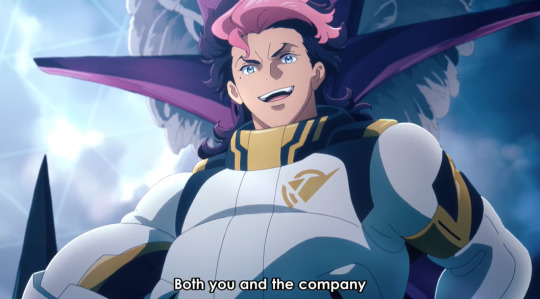
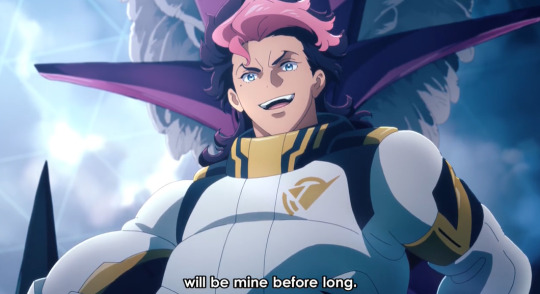
He is such a cool character. He's such a genuine piece of shit and at the start of the show I really thought, even if he did change, that I wouldn't like him, but by the time the show ended I genuinely wanted for his happiness as much as every other character.
So I just wanna talk about him I guess
Cringe analysis under the cut awooo awooOOoooOooo
I think it's important that Guel starts off the show as just an actual shithead. He's just the misogynist bully archetype at its core and he treats Miorine like property and everyone else like they're beneath him, but it's also important to understand the context of that behavior too.
Guel has basically everything. Money, Prestige, Power, Respect. Everything has essentially been handed to him on a silver platter, and as long as he continues to win duels (the only thing he is actually, GENUINELY good at) that won't change. And with that comes an insane amount of pride and arrogance. He expects things to go his way because, for basically his entire life, that's just how things have always been. In the business world that he's been surrounded by, the strong always win out over the weak.
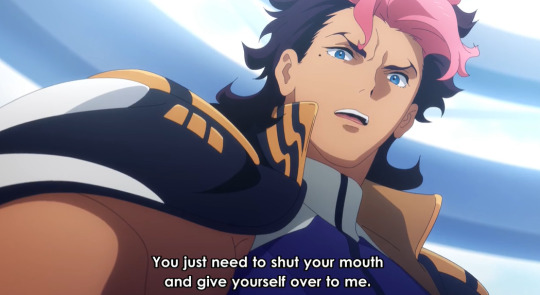
But with Suletta, all of the pride and respect that comes with his title and status is utterly and completely meaningless to her.

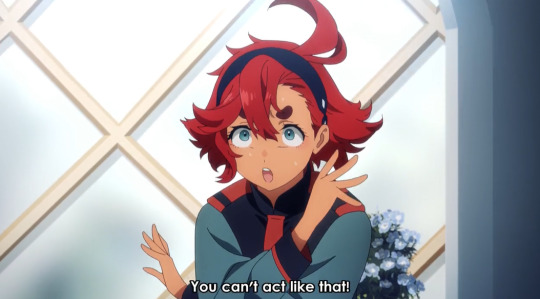
And he tries his classic shtick of listing out all of his titles on her, because in the world he lives in, that alone is what makes him worthy of either fear or respect.
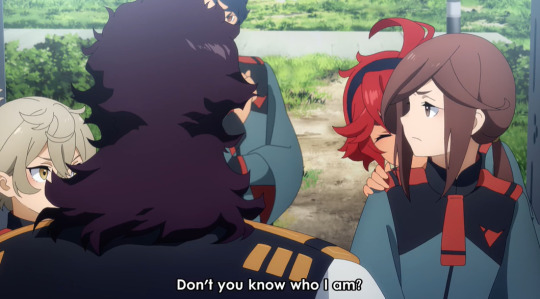
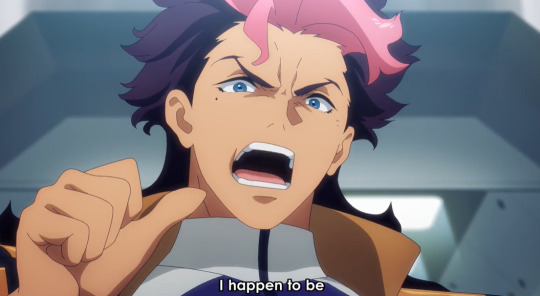
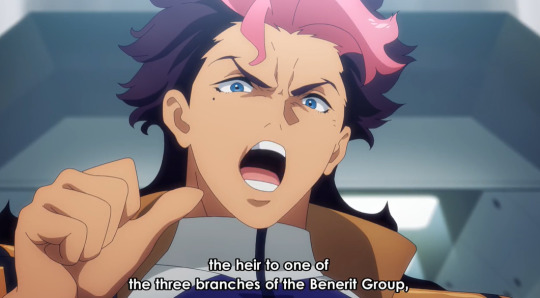


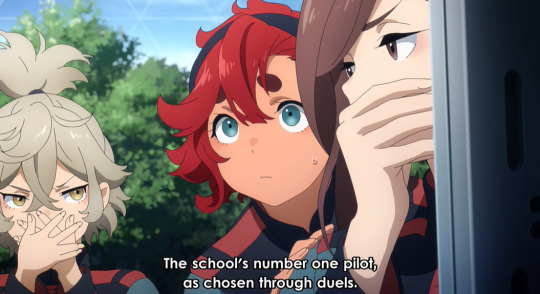
But it doesn't work on Suletta, because the world of the Benerit Group is not the real world, the one she lives in. She repeatedly looks past all of his flashy titles and admonishes and judges him for his BEHAVIOR, the true merit of his character.
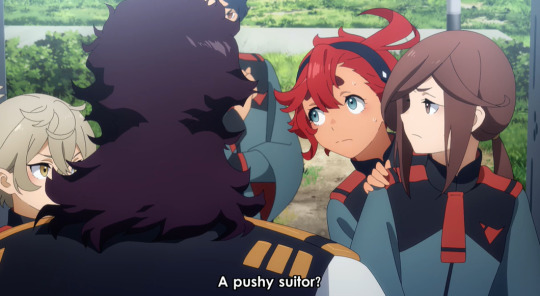
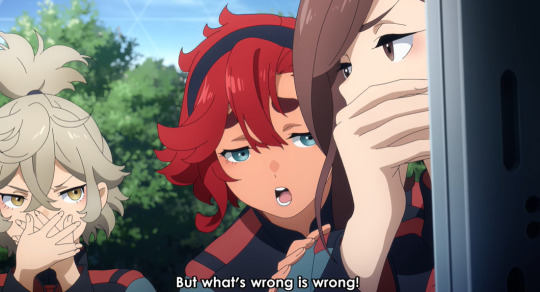
When she agrees to duel him, Guel sees it as putting an ignorant girl in her place. And why would he believe otherwise? He's always been on top at Asticassia, and this is no different. Dueling is the one thing that he KNOWS he's good at. It's the one skill that is definably his, that he truly earned through his own hard work. It's why he get so upset and defensive when Suletta looks down on him.
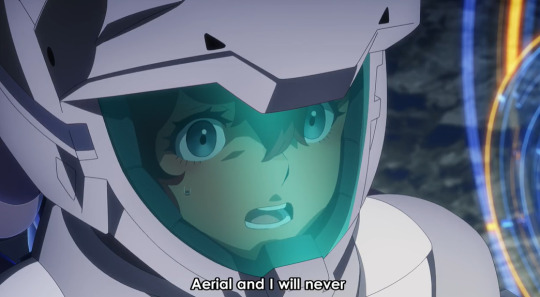
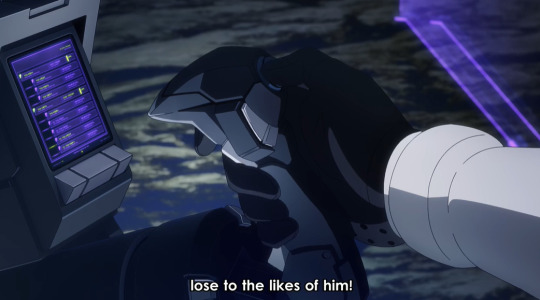
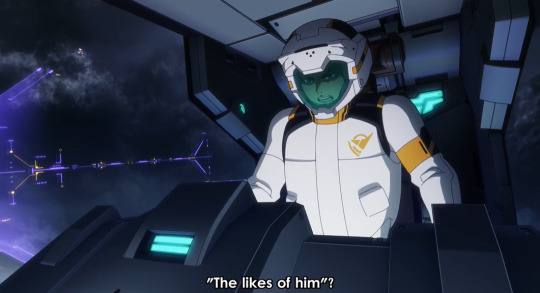
But the important thing here is that he LOSES to Suletta.
BADLY.

And the lesson Guel is forced to learn from this loss is that every single thing he latched onto in his life, everything that he decided makes him worthy of respect and admiration, is not only immaterial, but, more importantly, conditional.
His pride and status, his role as heir of the Jeturk Company, and, most damning of all, his father's love, was based entirely on whether or not he was the current Holder at Asticassia.
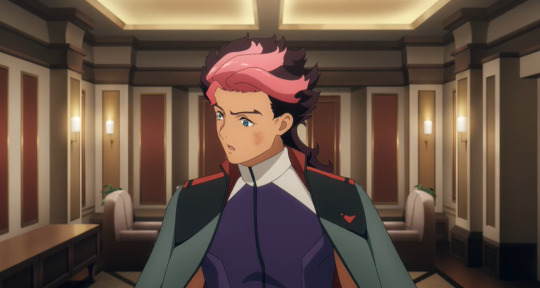
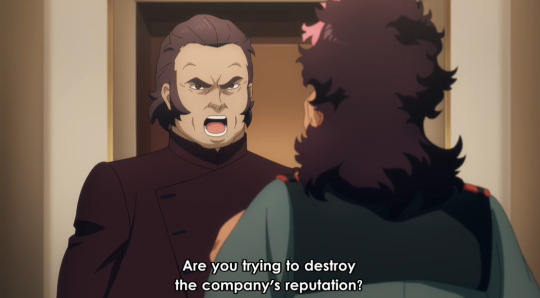
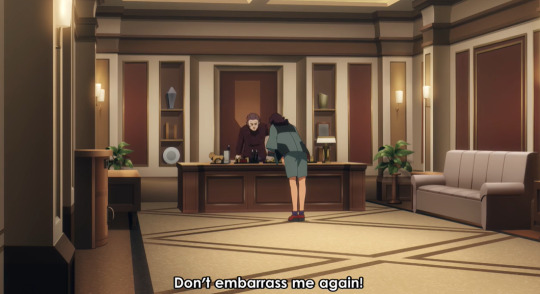
Because he lost one duel, (the FIRST duel he had ever lost, mind you) a duel to a Gundam that, based on what we know, was quite literally unwinnable, Guel's father slaps him across the face and yells at him.
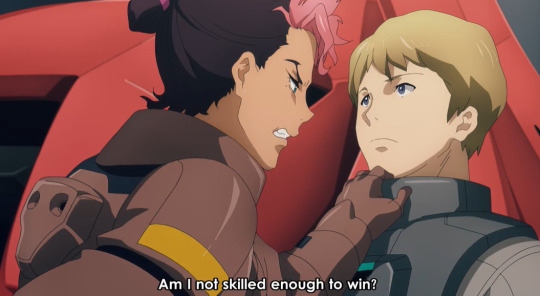
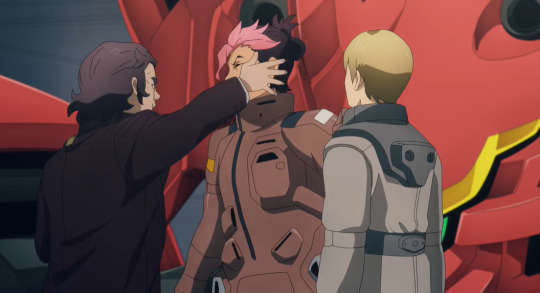
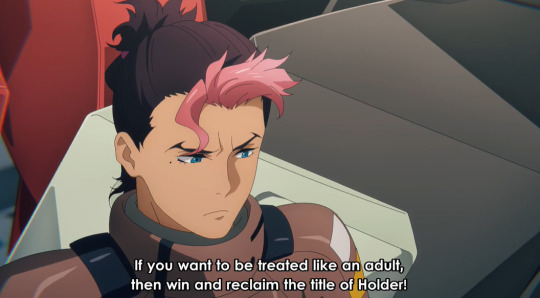
Before the rematch, when Guel is told that the Darilbalde is piloted by an AI, his father slaps him across the face AGAIN and tells him straight up that his feelings do not matter if he's not the Holder.
Which is why the scene where Suletta defends him from Secelia's taunts and explains her motto is so important

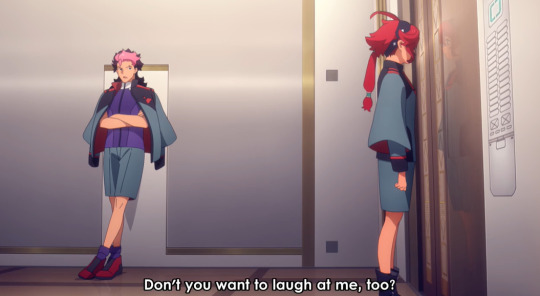
Everyone in Guel's life at this point, even his own father, looks down upon and mocks him for losing the duel. But Suletta isn't. She just tells him that even though he lost, he still deserves praise for not running away.
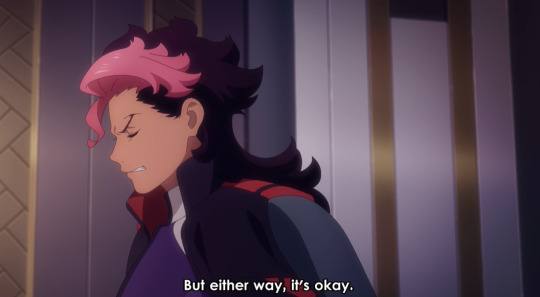
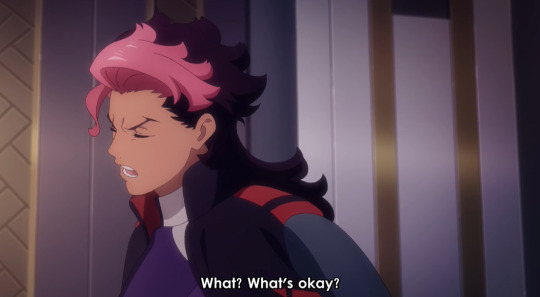
This is probably the first time in his life anyone has ever just told him that. That it's okay that he lost. That it's enough that he just tried.
Quick aside, but this moment here, when Suletta is talking about how much her mother means to her, and Guel holds his hand up to the cheek his father slaps him across hasn't, and will probably never, leave my brain.

But Suletta's words don't reflect Guel's reality. And the fact that he lost means even more is being taken from him, including his ability to even duel.
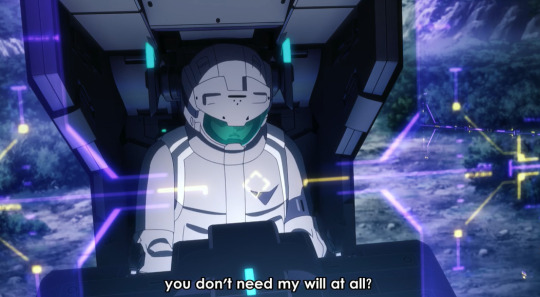
During the rematch, the Darilbalde doesn't even respond to his input. He, like Miorine, is having all of his decisions made for him, because without the title of holder, he's utterly powerless.

And the truly tragic thing here is that, once Guel smashes the AI and begins fighting on his own, he starts doing much better than when the AI was fighting and his father was cheating for him. He was genuinely a match for Permet 1 Aerial. But it's too late.
Maybe this is just me, but I always got the impression that if Guel was able to fight this battle on his own from the start, it would have been much more even, and he might have even won. But he didn't. He lost, again. And because of this, things are going to get much worse for him, really damn fast.
#guel jeturk#g witch#gundam the witch from mercury#sorry im on my 3rd rewatch now so. im gonna be annoying still#sorry.#fucking love that editing images on this image posting app doesnt fucking work properly#hey tumblr why dont you fix ur fucking post feature#THEN you can add stupid bullshit nobody cares about#or not do that too!#whatever!
63 notes
·
View notes
Text
Confessions of an Astral Assassin (part 2)
Her favorite time to take a shower was 10:30a.m, when the morning sun pierced through the obscured glass at just the right angle. It always danced upon and between the water, prismatic and gleaming. Each drop a diamond of purification, blessed by the giver of life, to bathe and baptise the flesh of yesterday in preparation for its rebirth today. It became her ritual, and so it became mine.
This is a place I often return, my consciousness a passenger to her's. I believe she senses me, in those moments her lips cut slight, involuntary smiles with each merge of consciousness. When I can see through her eyes. Feel with her hands. Bask in the healing water of jewels, and smell the scents she infuses with her hair. Relish the majestic stillness of the moment, removed from space and time. It was heaven. She was its Goddess. A Goddess named, Olivia.
I never pressed too far, nor too deep. I never wanted to. Not from lack of interest, but from a place of respect. Her thoughts are her own, and if she can indeed sense me, and wanted me to leave, I would. Without question. She knows my heart, and intentions. I...feel it. Even now, as we rinse our hair and trace the tingle of rivers down the curves of our back, I feel her open her mind to me. Like she wants me to see more. Feel more. She exhales a laugh that kills my hesitation.
I tentatively push my consciousness deeper, but only enough to feel the energy of her thoughts without being able to read them precisely. In my line of work, despite the grotesqueness of it, I try to hold myself to a higher standard of decency. Even the targets Im assigned to eliminate are given this measure of grace. Nobody should have the security of their soul's inner sanctum violated. Everyone deserves that privacy.
Like standing at the base of ruptured reservoir, I am completely engulfed in a deluge of emotions. Joy. Sadness. Pleasure. Pain. Certainty and uncertainty alike. She is a wellspring of all the things I've grown numb to in my own physical form, and I want nothing more than to marinate in the unbridled beauty of it all. I dilate the moment as long as I can, savoring the dance between sensation and emotion. The intermingling of material and immaterial bliss. Even in the present sadness, there is beauty and understanding. There is fluidity in emotions and none exist independently. Each has a relation to, and role among, the rest. A kaleidoscope of conscious and unconscious energy painting a perfect portrait of what it means to be human. Nowhere in the Conflux have I ever felt such divine beauty...
I feel a smile widen across her face and...is that a tear rolling down her cheek? Or just a drop from the stream? Does she feel my impassioned awe? My grand appreciation of her transcendental complexity?
Our hands trace down the curve of our breasts, and I see a flash of memories recalled by similar sensations and their associations from her past. The serenity of a lover's sensual touch, married with the ache of its loss twisting a taught tension in her chest.
Celine. The name manifests with the vision of a bright and vibrant face, before it dims into a pale, dressed-up painting on a corpse in a coffin. I feel the pressure in Olivia's heart seize, and she lets her arms fall to her sides with balled fists. All I want in that moment is to help ease her pain. I let my consciousness take control, just this once, and I coax her arms up, wrapping them around her form like a shawl. She chokes out an accepting whimper and tightens her grip. Streams of tears flow in the shower's rain and ripple in the small pool of standing water below. Sobbing begins to shake her body.
I extend my mind to her's, and show her some of what I have learned of death in my travels; omitting the role I have played in it. I convey to her, death's illusory permanance and the interconnected beauty of the Astral Conflux. I paint her an ever changing picture of the collective unconscious, and highlight the space she and Celine still share; even though her lover's body has long since left the material plane. I unlock those locked recesses of her mind so she can see that Celine has never left her. That the visions and memories that spring forth without warning are her attempts to tell Olivia this truth. To remind her of her presence, and communicate her love from beyond the mortal grave. They find each other again, and I am pushed back to my outer level of observation as their energies collide and enfold.
A familiar buzzing vibration snaps at my attention, and I feel my handlers' summons in the back of my mind. An implanted shock collar on the base of my cerebellum, stinging my every muscle like a furious hornet. I feel the distant memory of my muscles tense violently. They want me back. It's as if they could sense me experiencing one of life's many beauties. Like they can sense me using my gift of astral travel to spread awareness and rekindle love, instead of perpetuating their endless agenda of death. I stubbornly resist the call as long as I possibly can, cementing this wonderful reunion of two souls in my memory. May I never forget this sensation and the connection they share....
The cerebral quakes grow louder. More violent. Until I am snatched away, and snapped back to my reality...
#my writing#flash fiction#fiction#creative writing#sci fi and fantasy#writers on tumblr#writers and poets#astral projection#cosmic travels#astral plane#astral travel#love#romance#grief#unconditional love#spirituality#spiritual connection
21 notes
·
View notes
Text
"The Godspeed Messenger"

The sky stretched out before me in a deep blue expanse. As I flew, my eyes do no more than scanning the ground below, looking for messages to deliver as I hope not to fall like the others.
Even if my wings ache from my endless flight, I constantly look for safety, but the sky is filled with nothing but danger. I dutifully carry their messages through the turbulence of war.
In every beat of my puny heart, meant that something was reaching those who needed it desperately. A task I was forced to carry, even if the danger was ever-present.
-
All I remember is that I was deprived from my freedom and sent vulnerable to face in a struggle of men by myself. Always as a carrier of secrets and words, a messenger of peace from one hand, but a messenger of death sometimes.
I’ve been swept away and asked to bring news of loss and death countless times, that I wish for a gentle hand to free me from this immaterial cage I fly every time.
-
But alas, I cannot escape from this tragedy of chaos and despair. My wings yearn for freedom, a dance in the air, and a return home I’m not so sure I could even fulfil.
Across the desolate, darkened skies, over hell itself that men kind has brought upon these lands. Bodies lay strewn, nameless and forgotten. Their eyes now forever closed, gone is their hope for peace. Left in its wake only for sorrow and despair.
I turn away and fly, my heart heavy stays with grief. But I mustn't falter from my current mission, for I must allow to one more broken soul to live on.
-
The sky full of carnage is, and so is the grown below, from the symphonic clash of bombs and guns. I flap my wings, watching with admiration as the destruction of nature consumed the world below me.
I never imagined that for my eyes, destruction could be so frightfully beautiful sometimes. But man’s war had shrouded the land in darkness, so I flew on, for my guidance from the heavens above has allowed me to live another day, in this hellish ground.
-
I hunch in my cage once the message is done, alone and afraid for my next affair to be here soon. I know the endless struggle will tomorrow call for my fate.
Through the bars I can see sky again, but I know I must eventually return afraid. My wings are a reminder of a life of freedom no longer mine, instead a symbol of mastery in war that I have delivered for endless miles.
I dream of taking a Godspeed flight, out of dread once again, as far away from this life as I can get. But I worry that my wings one day to turn broken and featherless, to never ever feel the sun in a soar of freedom, high in the air.
-
But despite the gnawing fear, there is a glimmer of hope in my heart, that one day they’ll let me untied to their insanity and I’ll fly far away.
That one day men will feel my freedom again, and the world that vanished in disgrace, will be safely discovered once more in full bloom peace.
Original date of publication: 31/03/2023
Made using MediBang
#writer#art#artist on tumblr#artist#digital art#poetry#writing#indie writer#pigeon#ww1#ww1 fiction#world war one#military history#world war 1#ww1 history#painting#painter#poet#poets on tumblr#writers and poets#poetic#poems#original poem#short poem#short writing#writers#writers on tumblr#writerscommunity#birds#digital drawing
22 notes
·
View notes
Text
Funeral/Cemetery

I got different suggestions for that one, so I went ahead and did something completely else!
Asshole move, I know, but...let's hope nobody hates me all too much.
Characters: Námo & Haleth, Haleth/Caranthir
Words: 1 591
Warnings: Haleth is dead, Caranthir is sad, Erestor is lonely.
(Fic under the cut)

“This is a smidgen exaggerated, isn’t it?” Haleth asked, swirling imaginary wine in a beautifully wrought, entirely immaterial chalice, and nudged the tall, motionless creature by her side in affectionate comradery.
She was gazing at a lone figure, hunched over by grief, standing mutely in front of a stone, silent tears running like streaks of acid across wrath-reddened cheeks.
“These gestures are important to the Children—the First Ones, I mean,” Námo replied in his grave, echoing voice.
The Lord of Mandos could still not really understand how he had ended up in this unique position, but he had to admit that he almost enjoyed the companionship of the stubborn, irreverent soul who had decided to benevolently haunt him.
Like many another haughty, self-assured being, Námo had had to learn that Haleth of the Haladin was not one to be easily displaced or kept back against her will, and so all his exhortations and encouragements—ranging from discreet hints to outright threats—had not yet had any noticeable effect on her.
“By virtue of my life, my sacrifice, and my enduring love,” she had claimed confidently, “I demand the grace of being allowed to meet my beloved at least once more. Do you not empathise with the earnest longings of a wife and mother?”
Women, Námo thought now, not unkindly but definitely bewildered—they truly were something to behold. Lúthien, Andreth, Haleth of the Haladin—he had met his fair share of headstrong female Children, and he never grew weary of their unexpected and outrageous ideas.
“Morifinwë Carnistir is hardly one in whose name I had ever foreseen to be petitioned,” he hummed now as they watched that very Elf through a wavering screen of mist. “Good for him, I guess.”
Námo was generally not in the habit of feeling pity for those who had defied his words and commands, but—having experienced Haleth’s prodigious pig-headedness as well as her sparkling humour and her gruff kindness himself—he could appreciate how terrible it must have been to lose her.
“Oh, Moryo,” she sighed as she witnessed the unwaveringly stone-faced expression of wordless misery on that ever-fair face she had so loved. “Why do you return to that place when you know that I am no longer there?”
It broke her heart to see him thus, fossilised in his grief and robbed of his prodigious sense of purpose, laying down flowers by a moss-covered stone.
The blossoms, she knew, were even more short-lived than she had been, and there would be nobody but him to clean their remains away and replace them with new ones.
“Why bring imminent death to a monument to an irreversible one?” she breathed, reaching out a tendril of her essence as if to breach the fragile barrier between the realm of the living and her temporary abode. “Go and see about that son you’ve sent away.”
Námo did not interrupt her; thinking of his sister’s teachings, he just sat and listened, accepting the burden and instinctive sting of guilt for a loss he had neither caused nor could remedy.
A flash of knowledge entered his mind then, and he gave a muted sigh.
“He’ll die, won’t he?” she said without turning to the guardian of all souls. “He will do something stupid—as he’s wont to do—and he’ll perish. Will he suffer greatly?”
Hesitating for a moment—a rarity where Námo was concerned—he finally decided that she was strong enough to hear the truth.
“Yes,” he replied gently. “They all will as they all must. Rejoice though, Haleth of the Haladin, for soon he shall be by your side once more. May you give him the peace and closure he has been seeking for so long.”
When he had spoken his doom, Námo had been acutely aware of all that the exiles would sacrifice, destroy, and lose, but he had never considered what they would find.
Seeing the devastating, soul-crushing distress and desolation in Morifinwë’s fair face now, he wondered if this—having known plenty and pleasure only to have it run through their fingers like sand—was not the worst punishment, far beyond being severed from their kin, people, and the Blessed Realm.
“My son,” she then said. “Show me the blessed child I’ve carried in my feeble body, protected by the flimsy defence of brittle ribs and friable flesh.”
“As you wish,” Námo whispered, swirling a pale, long-fingered hand in the darkness of his own making and conjuring up the wavering image of a young Peredhel.
A lonely boy, he thought, as he glanced upon that serious, solemn mien and the irrepressibly proud bearing of one who had never been taught to laugh freely.
Those who had left these shores in anger and dismay, mere children following the folly of yet another clueless orphan, had at least had the support and solace of their siblings and cousins.
This one, going by the name of Erestor, had nobody but himself.
“This,” Haleth whispered, aggrieved, “is our fault. Neither Moryo nor I were exceedingly outgoing, and making friends was always exceedingly hard.”
“He has lost much when he lost the both of you,” Námo murmured, a tinge of sadness in his voice. “Take this as a token of my gratitude for your friendship, you wrothful, wilful child—your son will do great things. In time, he will find friendship and even love beyond the misery that has tinged your every happy moment.”
Had she possessed eyes to weep, Haleth might well have shed enough tears to bring Lord Ulmo to the Halls of Mandos.
Looking through the wondrous screen of mist and illusion once more, her whole essence shivered at the unchanged, immobile, petrified picture of hardened, weaponised grief.
“He has been so tender,” she whispered, as much to herself as to her companion. “Moryo was an excellent storyteller, an exceptional mathematician, and a marvel with thread and needle—surely, you can appreciate that talent in a spouse. I wish that I could have saved him.”
Suppressing both a sardonic chuckle and an aggrieved moan, Námo inclined his veiled head to her.
“You may take a sword and use it to cut your wood and meat, calling it a domestic comfort and a cherished item of intimate bliss and protection, but that does not change the fact that it is a weapon still. Long before you or any of your forefathers were born, he has been forged into a weapon, and all the love on either side of the ocean could not change that.”
“Will it ever be so?” she asked mournfully.
“No,” he admitted, casting his mind into a vague, ever-shifting future. “No, I believe not. For now, however, there is nought either one of us can do for him—Morifinwë must walk the bitter path he was set upon until he returns to our grace.”
She nodded, for she understood that there were things beyond her imagination and knowledge—Haleth, wise and rational, had come to make her peace with that fact a long time ago.
“What about the boy? Will he resent us forever?”
Again, Námo took his time—weighing the dolour of the past against the hope of the future—before laying an astonishingly heavy, solid hand on her incorporeal shoulder.
“Your life was short and ruled by terror and war,” he then said kindly. “Many things you have never learned, and it’s not for me to tell you about them, but—and you may hold that against them or praise them for it once you meet them—a few of the kinspeople of your beloved have shared a similarly deplorable fate.”
Haleth was exuding confusion and irritated frustration at those cryptic words of semi-prophecy.
“Your son shall,” Námo explained, toeing the line of what was permitted or even recommended to share with her, “very soon indeed, find people who share the resentful longing for heroes and criminals of a past they cannot shake. If he has but a fraction of your inner strength and obstinacy, he will learn to untangle his puerile disappointment from deeper, more complicated feelings and, with luck, even draw the right conclusions from the losses he has endured.”
Still, she could not truly make sense of the words that pierced her like bright blades and left her soul aching and bleeding with yearning.
“He is not the only Peredhel, Haleth,” Námo whispered into her ear. “And he is certainly not the only one to have loved and lost cherished role models and parents who forthwith are painted as villains by a people who need to look ahead lest the mistakes of the past devour all of them alive.”
“Does he—does he even remember us?”
“Nobody will ever forget you—for better or for worse—my dear little one,” Námo laughed, earnest amusement dancing in his weightless voice. “Not he, not the Valar, not the generations to come.”
The wavering image of Morifinwë Carnistir—Caranthir the Dark—faded into the abyss once more, and Haleth gave a choked sob of boundless anguish.
“I would say that it has begun, but…it shall end.” Wrapping his cloak around her shivering form, flickering like a dying candle, Námo held her close. “They will arrive soon—the first of the seven—for something in their soul tells them that they are being called back.”
An idea crossed his mind then. “Come,” he said, “let’s visit my wife. I want to tell you of Gondolin, and of the marvellous succour that may yet arise from the ashes of a doomed city.”

Thank you so much for reading <3
-> Masterlist for November (by @cilil)

#og post#IDNMT writes#fanfiction#writing#tolkien writing#jrrt#November#Nanowrimo2023#Námo#Halenthir#Haleth#Caranthir#Funeral/Cemetery
15 notes
·
View notes
Note
So I’ve been thinking about the ML Guardians AU, and about how when one of the kwami pair dies the other takes on a few of their traits, like how the Fox will have truth mixed in with lies when she talks, how the Butterfly is, well, chaotic now. So I was wondering how about water and fire? How does traits of water manifest with the Tiger of fire?
(Also absolutely no pressure to answer this. I get this is an old AU and my question is out of the blue.)
*cracks knuckles*
Since water and fire are material things rather than immaterial, it presents differently.
Firra the Fox successfully adapted to life without her partner by learning to tell the truth with her lies. Had Firra failed to adapt, she would have drowned in her lies, unable to find a Guardian let alone maintain a relationship with one. Truth and his Guardian were responsible for a lot of the Fox Guardian's early education until he or she learned how to speak Firra's language and play her game.
Nurru, on the other hand, being Order, was all about schedules and routines. Every day didn't have to be the same but deviations from the schedule or expectations were frowned upon. He liked things to be neat and tidy. Unlike Firra, Nurru never really stood a chance at saving himself. Losing Kaoss was such a fundamental disruption to his existence that he literally could not comprehend how it was possible, what life would be like without her, or how to proceed.
He should have retreated so deep into the concept of Order that he became a being of stasis and stagnation instead. However, his Guardian's behavior in the wake of their deaths became the compass by which he oriented himself. Revenge, grief, and desperation became the new normal for Order and, unfortunately, its created a feedback loop between them, which has spiraled them into chaos and madness.
Now, Baagh. As I said earlier, representing an elemental force rather than an a concept, he functions differently. He's not obsessed with fire, flames, etc. He doesn't orient his life around them. In the old days, he used to run hot enough on a normal day that he could set things on fire just by touching them for too long. He could ignite any and all parts of his body and it wasn't unusual for him to have some sort of open flame somewhere (a la Charmander tail). He wasn't afraid to cause fires because he knew that Water was right there to stop things from getting out of control and keep him in check.
So, when she died, he quickly realized that his safety net was gone and that a simple touch could burn a village to the ground. He could not live among people--ie have a Guardian--if he was just going to ruin their homes and lives by existing. So instead, rather than taking on the physical aspects of water, he changed his behavior to account for the loss of it. The way humans have to adapt their behaviors in a drought to prevent fires from breaking out. He learned to keep his body temperature low enough that he wouldn't start fires, he kept himself free of flames, and became far more cautious overall.
7 notes
·
View notes
Text
Alright apparently someone had to tell me “if you want to talk about witchcraft on your witchcraft sideblog, do it!” So guess what? I’m gonna do it.
So I was inspired by this post from @breelandwalker, but I’ve always wanted to make my own runes/symbol system for casting since I learned how to use Norse runes. I already had a symbol system, actually, because of course I did (it’s been incredible useful for making sigils).
So here they are!
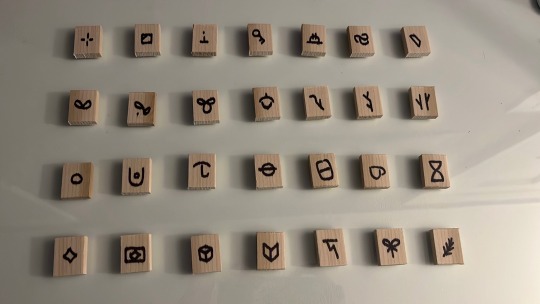
They’re organized by element in rows, because if you know anything about my practice you know its gotta involve the elements. At the top is fire, then earth, water, and wind at the bottom. I made an effort to balance out the symbols with positive, negative and neutral/complex meanings, so that each element had both good and bad omens, though I think wind and fire are slightly more positive and water slightly more negative.
So, the meanings! (Left to right, top to bottom)
Fire (symbol of the whole element): the core, the spark, the energy source, the physical/mundane realm, encompasses the whole of the element (much like an ace in tarot.)
The Quilt: generosity, protection, warmth and rest, home, a safety net/supportive community
The Candle: ritual/routine, an observance/vigil, duty, hope/faith, diligence, memory
The Key: power, privilege, authority, safety, opportunity, secrets, ideas/knowledge, choices
The Cake: gathering, love, an achievement, celebration, reward, intimacy
The Bag: responsibilities, stress, overwhelm, burnout, emotional baggage
The Brick: Institutions, foundations, building; but also, destruction, disruption, conflict.
Earth (symbol of the whole element): the social sphere, kindness, connection, wonder, gratitude, passion, other people, the whole of the element basically.
The Sprout: Spring, youth, vulnerability, innocence, empathy, growth, new life
The Firefly: Summer, vitality, color, passion, expression, community, wonder, fertility
The Acorn: Autumn, luck, knowledge, an opportunity to invest/prepare, harvest
The Branch: Winter, barrenness, regret, loss, peace, forgiveness, death
The Felled Tree: think the tower card in tarot. Chaos, misfortune, expulsion from comfort zone/a sanctuary, disaster
The Woods: distance from civilization, adventure, getting lost, nature, wonder and strangeness, possible danger
Water (the whole element): the spiritual, intuition, mental health, relationship to the self, fluidity, patience, mindfulness
The Well: creation, wishes, renewal, healing, a source of life, creativity, inner life/world
The Umbrella: an mental shield, a listening ear, peace amidst emotional turmoil, disconnection from emotions, mindfulness, avoidance
The Mirror: Reflection, judgement, redirected energy/projection, meditation, self-image
The Eraser: start over, frustration, cleansing, practice, low-stakes, mistakes
The Mug: “not for you”, toxicity/addiction, hostile environment, broken dreams, perfectionism
The Hourglass: time, cycles, mortality, “start now” “time is limited”
Wind (the whole concept): imagination, change, progress, wishes, magic, the mind, immaterial things, concepts, the “beyond” or the external/opposite of the core
The Patch: independence, grit, resilience, self-expression, controversy, weirdness/counter-culture
The Dice: luck, fortune, risk, laughter, games, levity, arrogance, superstition
The Book: intellect, knowledge, challenge, lessons, passive methods of learning, seeking
The Lightning Bolt: sudden change, clarity, direction, energy, motivation, an exclamation point
The Mosquito: annoyance, life-draining, conflict, grudges, “scratching makes it worse”
The Feather: comedy, convenience, avoiding consequences, freedom, escape, a favor owed
They are SO FUN, I highly recommend making runes like these. Having picked personal symbols, there was nothing to memorize (I made this whole post without looking at my reference) and after a few readings, they seem really accurate and easy to understand!
#cheshi muses#lithomancy#witchcraft#witchblr#divination#I have no idea why anyone would want to read these but here you gooooo
13 notes
·
View notes
Text
04: Satisfied
For: @prongsfoot-microfic
Month: March 2023
AO3: Link
Notes: Forms a vague arc with the following prompts: 02, 04, 31, 29, 26, 15, 01.
The thing about getting everything you wanted is that, perhaps ironically, it made you more content with what you had. That's how it seemed to work with James Potter, who rarely turned his mind to something without seeing it to its successful conclusion, who had been showered with love and affection from his earliest days and seemed to draw admiration as easily as breathing. His confidence, though verging on arrogance, was tempered by an innate warmth; even James' pettiness could be excused by most, fueled as it was by the mistreatment of others or by acts he deemed “unfair.”
Sirius, on the other hand, knew what it was to want and to be denied, to wallow in frustration and self-deprecation until you either locked those feelings away or were lost to them forever. His losses, if you could be said to lose what you've never had, had never been material: The House of Black was wealthy even compared to other aristocrats, countless generations of ill-gotten gains. What Sirius lacked, what he'd gone without for so long that he'd hardly known what he missed, were the immaterial things that made life worth living: A sense of home, a feeling of safety, the understanding of someone who saw you at your worst and weakest and loved you anyway. Love, that was at the heart of things-- A cavern in his chest that echoed with absence, a setting bereft of the only jewel that mattered.
It was an emptiness that Sirius assumed was as innate to him as his black hair and gray eyes: Some people were made for love, some weren't. Sirius fell into the latter category, or at least he did until he met James, who was most definitely the former, and who was determined to drag Sirius over the line until that void within Sirius began to diminish. It made Sirius almost pathetically grateful, which he was appropriately embarrassed by and did his best to conceal, though he wasn't entirely sure he succeeded. Still, for a few years, Sirius was content.
Come Fourth Year, Sirius witnessed the first denial of James' life, when James managed to finagle his way under the mistletoe with Lily Evans, who broke the mistletoe's charm with a clever counterspell and left James sans even an obligatory kiss, her auburn hair almost smacking him in the face as she turned away. James took it in stride, grinning good-naturedly, but Sirius caught a glimpse of James' face as he watched Lily walk away: The expression was foreign on James, all too familiar for Sirius. He'd worn that look when his parents had berated him for lacking the discipline of a proper Heir of Black; he'd looked like that when he'd returned home after his first year, shamed for his placement in Gryffindor. He wore that look again, for the first time in a long time, as he watched James watching Lily, suddenly aware that the emptiness he'd thought banished had merely become a different kind of need.
14 notes
·
View notes
Text
There is Something
There is something out there, in the dark. There is something that lurks out beyond the warm light of the stars in the cold reaches of the galaxy. It does not speak any known language, it does not trade or build great works. It simply drifts along in the vastness of the blackness that permeates the spaces between stars. If your ship encounters it, something will try to board it. If it succeeds, it will... change the crew. And the crew will return to their home port, flooding the bands with screams of truest, deepest terror. They will open fire with whatever weapons they have aboard, seeking to kill anything and everything they run across. They cannot be reasoned with, we don’t even know if they can hear us when we broadcast demands for them to cease fire, to prepare to be boarded, to quench their engines or be killed. So we kill these ships, and their crews, and every time we do we wonder what it is they saw. What happened to them? What could possibly have been done to them?
The answer, ultimately, is immaterial.
The light of faith had guttered like a candle in a cold wind in the centuries that elapsed since mankind slipped the surly bonds of earth. The blaze of faith that had once sent thousands to the afterlife and had kept millions more through trials that I cannot even conceive of, was just a low bank of embers. What need was there of faith out among the stars? Where humanity ruled supreme, where the only God was trade, the only hymn the hum of a ship’s engines.
But we had found our faith again. A common faith, a faith in mankind. A faith that taught that whatever tribulations were yet to come, whatever monsters that came crawling from the long dark, whatever disasters that would befall us, humanity would persevere. We would dig graves for the fallen, we would weep for our losses, and then we would shoulder our tools and go forth once more. Let the skies boil and the seas churn, let hideous things come to kill us from the black, we would not fail, and we would not falter. The aging Pontifex, his beard grey flecked with white, stood at the door to his cathedral and proclaimed a Crusade. A Holy War, a calling for men and women of all planets and all nations to set aside their differences, for there was a threat to humanity.
We answered the call. The Pontifex called, and we answered. It began as a trickle, a merchant captain who bid his crew with families go ashore and took those who remained with him. A pirate cruiser whose crew wished to die doing one thing right in a life of misdeeds. The crew of a battleship that all-but mutinied before they were given leave to come. Merchantmen purchased by collection plate. A thousand ships, from tiny little sub-light barges to massive fleet carriers and everything in-between. A thousand ships crewed by men and women of such courage and faith that I cannot but weep for it.
Humanity called, and we answered.
We don’t know what awaits us in the darkness. We don’t know what was found out there, that drove those crews to fratricide. We don’t know if we will live or die. What we know is this one simple truth. Humanity will endure. So my crew, my beloved crew, light the engines. Make ready the ship to supercruise, and say one last blessing over the guns. We are the clenched fist of mankind, we are the instrument of humanity’s fury, we are the Crusade of Man, and we shall know no fear.
#hfy#humanity fuck yeah#sci-fi#creative writing#ficlet#short story#short fiction#yeah i think i'm back#back in black#shady's back#back again
57 notes
·
View notes
Note
the ever-looming question remains : why Minathra? What is there to confide in / what familiarity is there to be found other than that of instrumentalization? That of corruption / twisting of personhood & ideal, the brutal loss of faith? [ you know that now; you will never be able to still your hand again / not when the sickening, nauseating sentiment writhing away in the pits of one's stomach keeps wuthering on. Splitting every thought, value & feeling ]. ⸻ she tries to steady whatever worm-bound surge of recollections haunts / disorientates; attempts to make a clean cut between what is Sharrian & what is Drow.
A handful of strand of crudely trimmed white bangs sting in her eye when she tilts her chin. At the distance the cleric keeps Minathra seems almost amicable in nature [ to you who has always found solace in the dark & macabre / 'self-indulgent' & a 'hypocrite' she called you. What does that make her? ]; when Shadowheart speaks, tone kept steely & low, they are alone, figuratively & literally. " did you regret it? Turning your back on Lolth, swearing fealty to another? "
night always brought strange tidings with it; stranger truths, too. the aches and pains of the day well-earned; present. and though the night warden hated to rest while their enemies still drew breath, she knew it was fruitless to continue when all were so exhausted. minthara had never been allowed to be a child: always a soldier, always marching - and then, commanding. even toy soldiers knew when to stop, after all - she was no different. none of them were so different, though minthara would never sully herself by admitting it while keeping company with such a desperate mix of miscreants.
at the sound of soft footfalls, her head sharply turns in the cleric's direction, ears trained to hear even the slightest of noises straining in the quiet; the harsh, tense line of her shoulders softening when she notes that it is just shadowheart come to pay her another visit. minthara knows she is not well liked in camp - she does not care; their feelings are immaterial in the grand scheme of things: there are battles to be won, and gods to kill.
" it was not as if i had much choice in the matter. " not the second time, no. but the night warden does not mention the first - when she had come home to menzoberranzan gleaming like the north star; bright and furious and beautiful. she'd been punished for what her own mother had called a lapse in judgement; remembers the feeling of her nails digging into her arm before she was brought before the matron mother. idiot girl, ungrateful girl - look at all lolth has given you, given us - and you would spit in her face? that had been then; and this was now; different, yet all the same in lolth's eyes.
and, perhaps, it was the same in shar's as well. once again, her red eyes glance up towards @nerimoi; narrowing slightly. had she changed her diet recently? whatever it was, the pallor it gave shadowheart did not suit her. but the words do not come - and instead, she feels the worm that connects all of them wriggling, eager to share flashes of memories, thoughts - stone and stalagmites; the comforting darkness of endless caves - looking out over a sprawling mess of a city; your blade in hand, the life leaving who you thought was your friend's eyes as they spit and choke on blood - they'd tried to kill you, to advance. for lolth. you had to kill them; cull the weak, for lolth; that weakness in you; that curiosity. that questioning. why? the connection severs - but the sensation remains.
minthara, daughter of the baenre, knows who she had been. knows who she was - but she does not know who she is now, without all these certainties; these absolutes that had guided her life and her hand. and though she does not voice it, she suspects that shadowheart is the same. the thought terrifies her. and if shadowheart is a hypocrite, then so is she.
" no. i do not. " blunt as ever, sharp as the knives she carries. her eyes, for once, are not focused upon shadowheart; nor does she gaze into the fire. instead, she looks to the stars - and a thin smile makes its way across her features. she does not miss the beauty of menzoberranzan so painfully when she has the glory of the stars to behold. lolth - the absolute - both left nothing but bodies in their wake. minthara would not be one of them. she would be greater.
" nor should you. take back the power your dark lady has denied you - and make those who belittled you suffer. "
#minth: i hate lolth#also minth: still spewing lolth mantras#solid advice minth good job!#nerimoi#ANSWERED. missives to the night warden.#ACT II. soon there will be vengeance. then; freedom.
1 note
·
View note
Text
Witch Noir Magic Types Bracket
Round Two Seed Three: Stranger vs Oracle
Stranger [BODY HORROR]
A Stranger can gift or be given, trade, or steal bodily features from other human beings, up to the entire body including internal organs. Part of the magic is that they, and the other person provided the exchange is consensual, don't have to worry about blood type compatibility or other similar concerns. They do still feel the pain of removal and suffer blood loss when relevant, although their recovery time is much shorter than it would be for a non-magical transplant. The exchange is very difficult and takes a lot of energy, but causes no additional damage when it's consensual. Due to the fact that body theft will have naturally occurring spiritual resistance even from non-magical victims, the process is much more taxing on the Stranger and will usually result in spiritual injury which in turn can cause a tangibly lower life expectancy in addition to severe emotional problems. Strangers are considered some of the most powerful witch types and are highly sought after by Covens. They are also one of the rarest witch types, and frequently gain a minor celebrity status due to Covens bragging about them. They tend to be the magical equivalent of surgeons.
v.
Oracle [POSSESSION]
And Oracle is susceptible to and can survive possession. Possession is performed by any being from the immaterial world, including gods, demons, and ghosts. Possession is extremely taxing both physically and spiritually for both the possessing being and the possessed. Generally, possession is too difficult except for the most powerful being unless there is some level of compatibility or vulnerability to the possessing being in the potentially possessed. Even when there is compatibility, and especially when there is vulnerability, most victims of possession will die shortly after the possessing being leaves due to the intense physical and spiritual stress of the ordeal. Oracles, however, are something of a spiritual Type O-. Just about anyone can fit in there, and the Oracle will not have what amounts to spiritual anaphylactic shock to them. They do tend to be very vulnerable to non-consensual possession because of this, though, and spiritual assault can cause severe mental/spiritual injury. Like other Clairvoyants, Oracles are oppressed and shunned in witch society based on the idea that they attract aggressive/malevolent immaterial beings.
#interesting that the two Consent Issues TM ones are up against each other#jack facts#jack chats#polls#poll#bracket#magic#magic types#magic system#world building#writing process#witch noir
2 notes
·
View notes
Note
A kit for Sandclan! Cobrakit, a short-furred ginger tabby tom
(Forgive that I'm not giving Featherstorm's reaction for this one. It's not personal, I simply have run out of fun things to write for that section.)
A TOM!!!!! YES, THANK YOU! We are severely lacking those, our gender ratio is sooooo skewed.
But anyway! Chart!
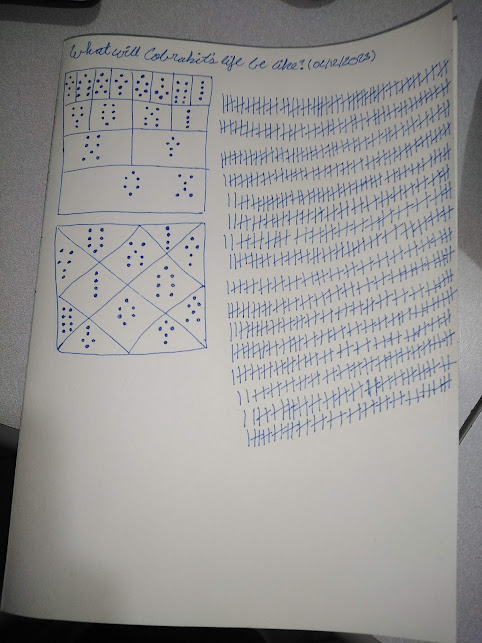
[Image ID: Under the header “What will Cobrakit’s life be like? (02/12/2023)” 16 rows of tally marks crossed out two by two until there is only 1 or 2 left uncrossed. To the left, a shield chart at the top with the following geomantic figures: Via as the first mother, Populus as the second mother, Puer as the third mother, Carcer as the fourth mother, Puella as the first daughter, Amissio as the second daughter, Laetitia as the third daughter, Puella as the fourth daughter, Via as the first niece, Rubeus as the second niece, Tristitia as the third niece, Fortuna Maior as the fourth niece, Puella as the right witness, Albus as the left witness, Carcer as the judge, and Coniunctio as the sentence. Below the shield chart, an astrological house chart with the first twelve geomantic figures above mentioned assigned to houses 1 to 12 in the order mentioned above. /end ID]
This chart's a little more evocative. Immediately I notice Carcer as the judge and Coniunctio as the sentence so some kind of restriction or bondage, whether physical or immaterial, is the overall theme of Cobrakit's life but in the end it will bring connection and community. I'm lowkey hoping this chart will look overall favorable for a leader. Cobrastar sounds so cool. Anyway, our witnesses are Puella to the right and Albus to the left. Puella and Albus are weird in opposition, the former representing emotions and putting the needs of others before one's own and the other wisdom that comes with age. Is the chart trying to tell us Cobrakit will defy the status quo? Will they stand up to the establishment in service of others? Still hoping for a leader-like character here...
Via in the first house is always a welcome sight. The symbolism of motion and change always lends itself to eventful character biographies.
Populus in the second house is also welcome because I honestly just appreciate not having to think too hard about what the association of the second house with material posessions even could mean in this setting. This is seriously the biggest weakness in the method I believe. If anyone has any suggestion for how I could work the second house more cohesively into the system, I'm all ears.
On the third house we have Puer. I know I said that interpreting Puer and Puella simply by their meanings as signifiers of the gender polarity was boring and all but. I've wanted to give more of these siblings and we are in need of more toms so... an all male litter? I'm thinking three or so.
Carcer in the fourth house is something we have seen before! Strict parenting and/or mentorship. I'm leaning towards mentorship more. I do still want to see if I can finnagle this into Cobrastar.
Puella in the fifth house which I'm choosing to interpret as Cobra will grow up to be a nurturing parent. We love to see our den dads around these parts and I'm taking any excuse I can.
Amissio in the sixth house... You know what we are missing? A character with a cool scar or something. I am picturing the loss predicted here to be perhaps... losing an eye? Once again, would make a lot of sense if we're trying to slot this chart into a potential leader.
Laetitia in the seventh house! Good family life with his partner. I like that. I like that.
Puella in the eight house. Overlaps a little with Hickorydawn's whole thing but I think if I'm already dead set on leader for this one being able to be a comfortable presence for his clan in their time of need would be good. Honestly, between Puella here and Puella in the fifth house, I'm just thinking this dude would grow up to be just a super charismatic and comforting presence in the Clan.
Via in the ninth house. We already saw it in the first house and here it reinforces the idea he had a transformation of some kind. The rest of the chart is not implying it yet, but I think I have an inkling of what I can weave with the last three houses...
Rubeus in the tenth house is where I think I can get my angle in. While the chart has been portraying him as a pretty uncomplicated and chill dude thus far, the notion that anger and positions of power are related for him is certainly interesting. I could perhaps say, could he initially ascend to deputy on the basis of being a more aggressive type than he ended up being? Was the journey in question about mellowing out? Perhaps this is how he lost that eye I decided way back in the sixth house.
Tristitia in the eleventh house we can build this up further. Tristitia, sorrow, in the house of allies and supporters perhaps refers to how his supporters will react to his mellowing out. Perhaps as he turns to a new cat he can and becomes an emotional support for his clan his old supporters will lament a lot about who he used to be.
And finally Fortuna Maior in the twelfth house. He'll have to work hard to overcome adversities (perhaps those who liked him better how he was before?) but in the end he will thrive by his own efforts.
Putting it all together:
Cobrakit was born alongside two brothers. He was apprenticed to a warrior that was very strict with him and encouraged in him an aggression that would earn him a reputation as a ferocious fighter. He even lost an eye to show for it and everything. This put him in the radar of the leader as a favorite deputyship candidate of a certain vocal faction of aggressive cats within SandClan. He of course gladly accepted but the position of responsibility began to make him rethink his approach. Particularly as the Clan came to rely on him more and he took on more of an interest in being an emotional support through the tragedies of combat and death, he began to mellow out. The faction that had initially favored him for deputy felt extremely betrayed at this but Cobra now stood up for himself on his own authority and his likability as a deputy. Along the way he found a partner, raised children on his own, and has grown quite well into his duties as deputy and, eventually, leader.
So, give it up for the leader of SandClan Cobra(strike)star!
#and with that I sign off#thanks y'all and good night!#warrior cats#wc#warrior cats oc#wc oc#fanclan#sandclan#final count: 7 not counting Featherstorm#which I don't#I fully intend them to be dead by the time of the default time of the allegiances#was the one to draw up the chart for every single other cat from the oldest elder to the youngest kit#they're ANCIENT#BTW final count is for like over the weekend#I am still going to do a few more over the week#you have two hours to send your ask with the description and kit name though#midnight my time no longer taking them
4 notes
·
View notes